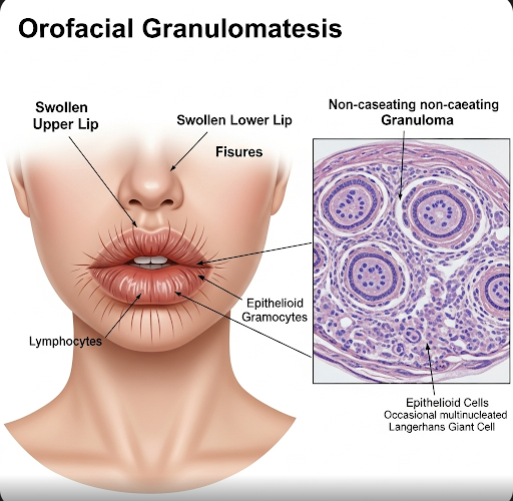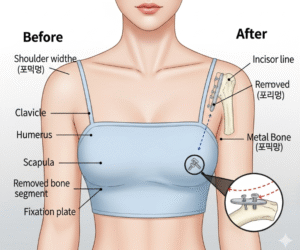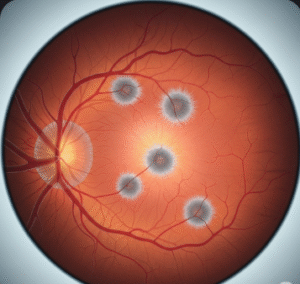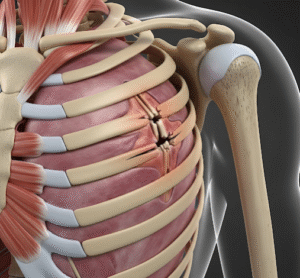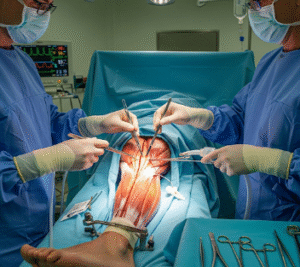Overview
Orofacial Granulomatosis (OFG) is a rare inflammatory condition that affects the mouth and face. It is characterized by persistent or recurring swelling, especially in the lips and cheeks, often accompanied by oral ulcers and other mucosal changes. The condition is not fully understood and may occur on its own or in association with systemic diseases such as Crohn’s disease or sarcoidosis. Though not life-threatening, OFG can cause significant discomfort, cosmetic concerns, and challenges in diagnosis and treatment.
What is Orofacial Granulomatosis?
Orofacial Granulomatosis is a chronic, non-infectious disorder marked by granulomatous inflammation—clusters of immune cells—in the soft tissues of the orofacial region. It typically presents with swelling of the lips (cheilitis), oral ulcers, gingival enlargement, or cobblestone-like changes in the lining of the mouth. In some cases, it may be the first visible sign of a systemic condition. The exact cause is unknown, and it is considered a diagnosis of exclusion, meaning other conditions must be ruled out first.
Symptoms
Symptoms of OFG may vary but commonly include:
- Persistent or recurring swelling of the lips, cheeks, or face
- Oral ulcers or painful sores
- Gingival (gum) swelling or enlargement
- Fissured or cracked lips
- Cobblestone appearance of the inner cheeks or tongue
- Numbness or tingling in the face
- Difficulty eating or speaking in severe cases
Causes
The exact cause of OFG remains unclear, but several factors may contribute:
- Allergic reactions (e.g., food additives, cinnamon, benzoates)
- Genetic predisposition
- Immune system dysfunction
- Association with systemic conditions such as Crohn’s disease, sarcoidosis, or tuberculosis
- Chronic local infection or trauma
- Environmental triggers (e.g., dental materials, preservatives)
Risk Factors
- Family or personal history of autoimmune or inflammatory diseases
- Young adults and children are more commonly affected
- Allergies to specific food substances
- Gastrointestinal disorders, particularly Crohn’s disease
- Previous history of oral inflammation or soft tissue swelling
Complications
If untreated or misdiagnosed, OFG may lead to:
- Permanent tissue changes or disfigurement
- Recurrent oral pain and ulcers
- Social anxiety or psychological impact due to facial appearance
- Difficulty eating, chewing, or speaking
- Misdiagnosis as other conditions, delaying appropriate care
- Potential progression to systemic disease (e.g., Crohn’s disease)
Prevention
There is no definitive way to prevent OFG, but the following steps may help manage or reduce risk:
- Avoid known food allergens, such as cinnamon, chocolate, or benzoates
- Use hypoallergenic toothpaste and oral care products
- Treat any underlying systemic conditions promptly
- Maintain excellent oral hygiene
- Get regular check-ups with both dentists and physicians if symptoms persist
Treatment Option in Korea
South Korea provides advanced diagnostic and treatment options for Orofacial Granulomatosis, combining dental, dermatological, and gastroenterological care for a holistic approach. Treatment strategies include:
- Elimination diet to identify and remove potential allergenic triggers
- Topical or systemic corticosteroids to reduce inflammation
- Immunosuppressive therapy (e.g., azathioprine, methotrexate) in severe cases
- Antibiotics like metronidazole or clofazimine when infection is suspected
- Management of underlying conditions such as Crohn’s disease if present
- Oral and maxillofacial surgery for persistent or severe swelling
Top-tier Korean hospitals such as Yonsei Severance Dental Hospital, Seoul National University Dental Hospital, and Samsung Medical Center offer multidisciplinary care with access to oral medicine specialists, dermatologists, and gastroenterologists. These institutions provide precise diagnosis, allergy testing, and personalized treatment plans tailored to both local and international patients.

